Student Blog

OTAC? Oh Yeah! ⟩
November 4, 2016, by Kimmy
This past weekend was the 40th annual Occupational Therapy Association of California (OTAC) conference, which also marked my 1st conference experience! The conference brought together practitioners and students from all over the state to celebrate OT. Throughout the day, presentations discussed new innovations, ongoing research, and developing programs — including USC’s own Global Initiatives!
After learning about and watching demonstrations of canine-facilitated intervention, I walked over to the exhibition hall. Along the perimeter, researchers presented posters on their latest studies. Trojans definitely represented! In addition to research, many schools were publicizing degree programs and companies were recruiting future therapists. The expo hall was buzzing with OT spirit!
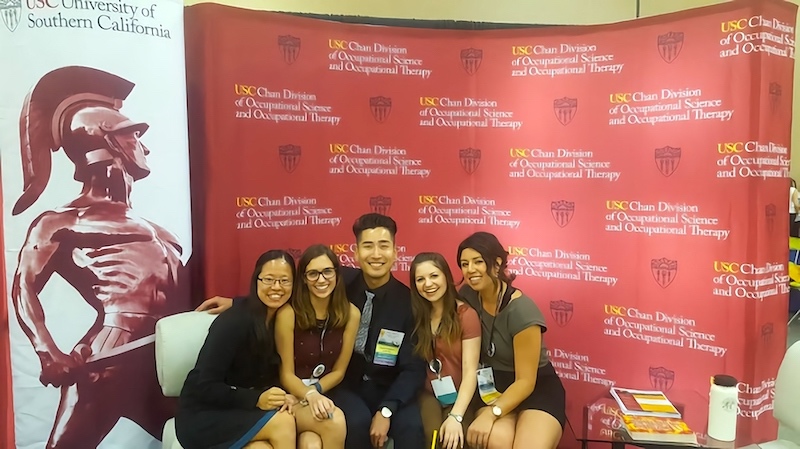
Getting comfy at the USC conference booth
In the spirit of work-life balance, the conference also involved some great parties! After all, celebrating is one of OTs’ favorite occupations! On Friday night, the USC Chan Division hosted a spectacular alumni reception with the fitting Halloween theme of “Fright On!” On Saturday, conference attendees came together to celebrate 40 years of OTAC at the President’s Reception. Before hitting the dance floor, we heard from a long line of past presidents and current board members.
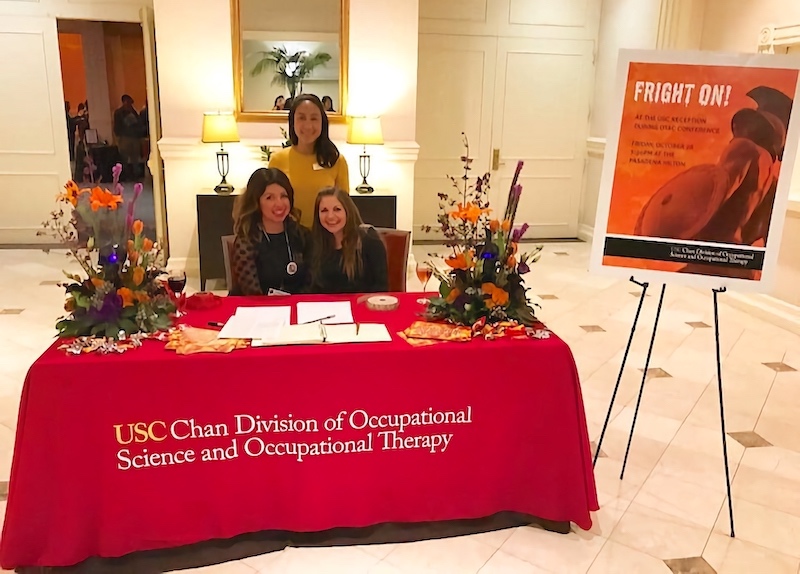
Fright On!
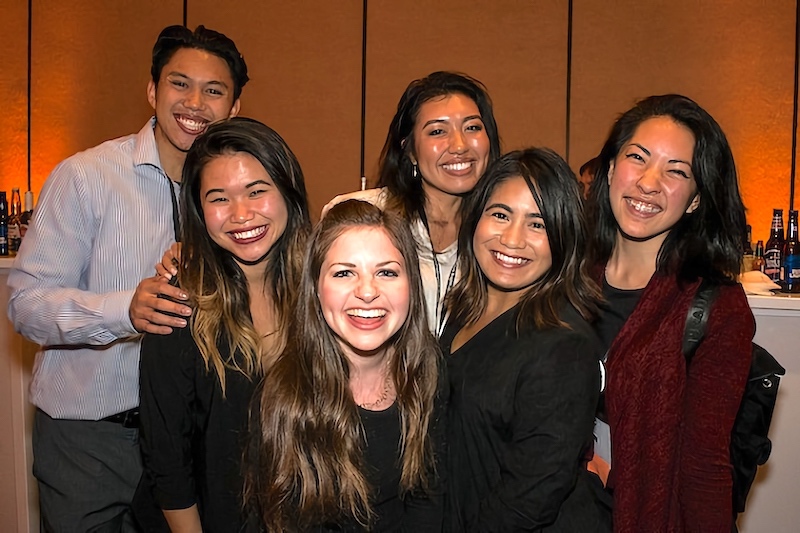
Students at the Alumni Reception!
I had a great weekend with my classmates and future colleagues. After my first conference experience, I can’t wait for the AOTA Centennial Celebration!
⋯

Play All Day ⟩
November 1, 2016, by Jessica
Hey everyone!
I apologize for being offline for a while — things have been so busy this semester with midterms and events! I wanted to update you all about another one of the awesome resources we have here at USC — our pediatric therapy gym! We are so lucky to have the equipment and resources to be able to practice what we’re learning in an interactive, hands-on way.
A few weeks ago we had our Sensory Integration lecture and lab, where we got to learn about the theory behind Sensory Integration therapy and interventions we could use during treatment. For those of you who don’t know what Sensory Integration therapy is, it is both a theory and intervention based on USC alum’s Jean Ayres’ work. It focuses on how a child’s body integrates sensory information (vestibular, proprioceptive, and tactile) in order to navigate their environment effectively. Through Sensory Integration therapy, the goal is to facilitate an adaptive response, which is a successful goal-oriented action on the environment. For some children with sensory issues, their bodies and brains may not be integrating the sensory information from their environment effectively or efficiently, which can affect a child’s ability to participate in their occupations, such as play.
This is what I love about OT — what looks like “play” is so much more complex and layered than what it seems. And as OTs, we can use play as a means and ends in our treatment sessions with children, since play is one of their main occupations!
Here are some photos from our Sensory Integration lab, where we actually got to jump on all of the equipment and try it out for ourselves! Doesn’t it look like hard work?
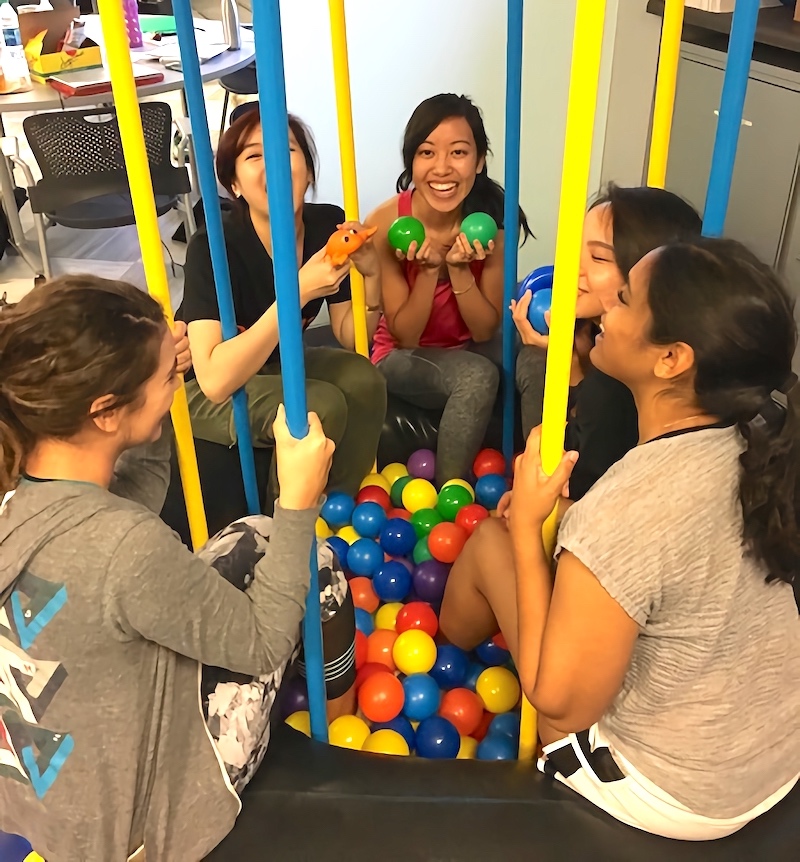
Having a ball!
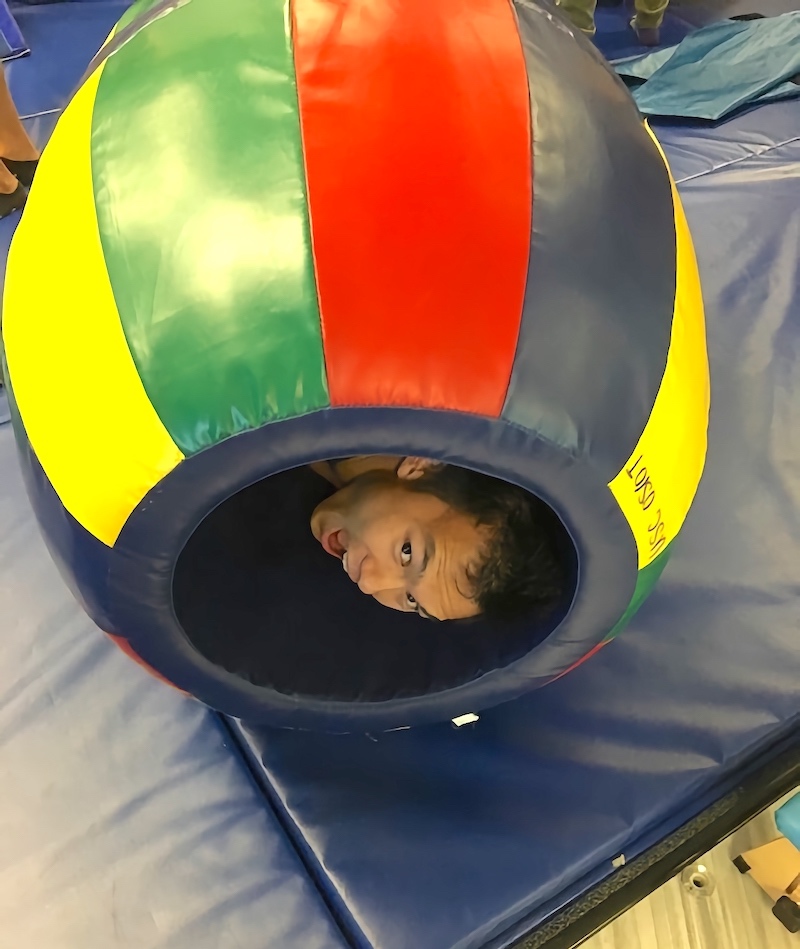
Just rolling through life
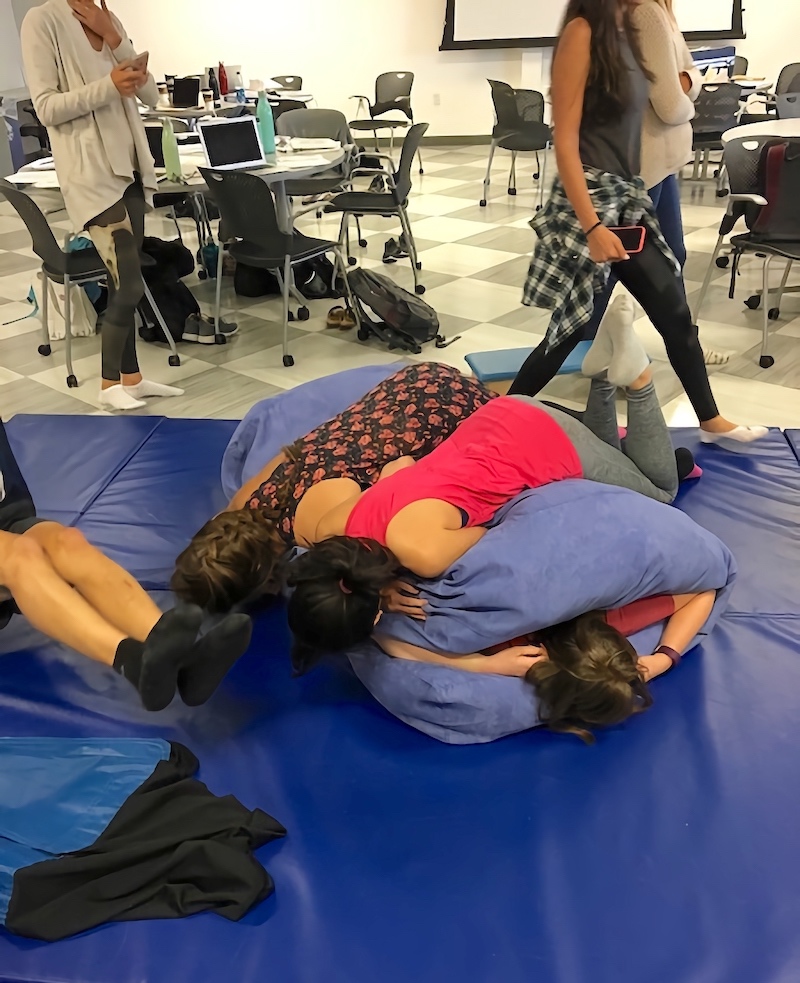
Feeling the (deep) pressure of OT school
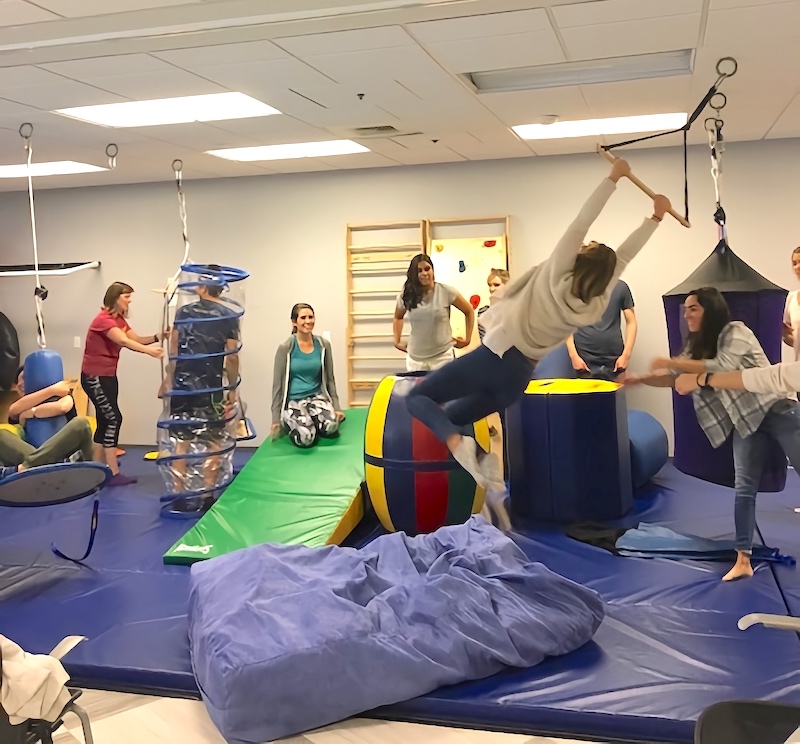
Hanging out
⋯
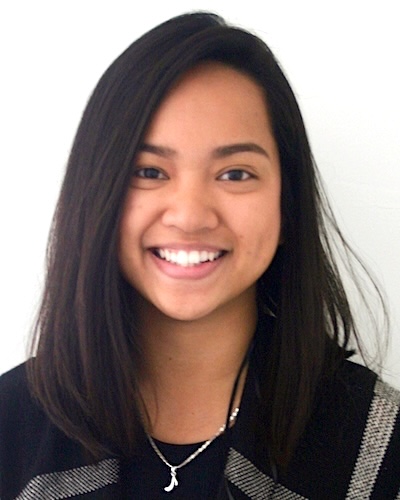
The Occupational Therapy Association of California Conference ⟩
October 31, 2016, by Raisa
I had the pleasure of attending my first OT conference, hosted by the Occupational Therapy Association of California (OTAC). The USC Chan Division was generous enough to sponsor the MA-1 class so we could attend one-day of the three-day conference, yay for professional growth!
If I were to summarize my entire experience with the OTAC conference I would say it was refreshing. Two seminars struck me the most, one focused on patient relations, the other focused on the use of everyday technology with clinical reasoning. Let me summarize my two most important insights from the conference.
First, communication is KEY! Being a knowledgeable therapist is not enough. We must have the compassion and empathy to effectively treat our patients. Being able to effectively communicate with our patients is key to helping them restore function to their lives. You can be the best therapist with the best treatment plans and exciting activities, but if you do not have the heart nor the compassion for therapeutic communication you might not get your patient to that next level. Let’s face it, Therapeutic communication is not easy, I’ve been practicing for almost a year and I still have trouble finding the right things to say. However, this is a skill that can be honed and sharpened. It is up to us to perfect this skill of therapeutic communication to become effective therapists.
Secondly, get your hands on some technology, in recent years we have seen a huge boom in technology. Society has greatly benefited from the internet, computers, smartphones, tablets . . . the list goes on. My point is, technology has great potential not only to help the good population but also help our patients. Technology generally makes things easier and efficient for everyone. Today technology is already gaining popularity in OT practice but I believe that this will soon be a good niche for future practitioners. I predict that this will be a major focus for future research and development in the OT profession.
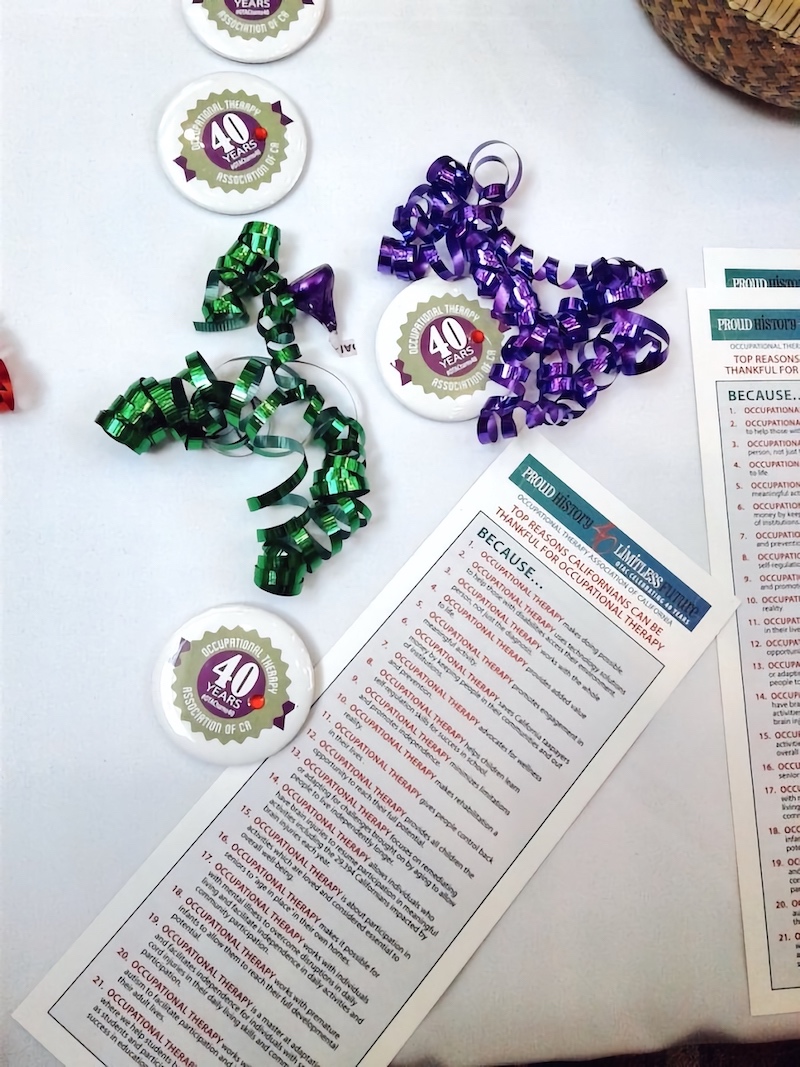
The OTAC conference was refreshing in a sense that they were able to shed some new light into already existing concepts of practice in OT. As a student, the conference proved to be insightful and led me to think about my future practice. This was my first OT conference and it certainly won’t be my last. I encourage you all, students, practitioners of all levels to join your local OT conferences. Learning is a never-ending process, and this is one process we should all take advantage of.
⋯

Be a Bookworm! ⟩
October 27, 2016, by Kimmy
School/Life Balance What are OS/OT?
One of my favorite occupations is reading. In my spare time, there are few things I find as comforting as curling up with a good non-textbook book in one hand and maybe a warm latte in the other. Keep on reading to hear about some of my recent reads with OT themes . . .
After completing the adult rehabilitation immersion, I found myself intrigued by first-hand accounts of people living with physical disabilities. During the summer, I read “Stroke of Insight” by Jill Bolte Taylor, whose story has now become a widely-viewed TED talk. As a neuroanatomist, Dr. Jill provides a unique perspective of her cognitive impairments in real time while she experiences a stroke herself. The book details the cerebrovascular accident itself, as well as her long path to recovery.
In addition to exploring non-fiction, I have become a fan of novels that capture the disability or different-ability experience. Jodi Picoult has been a long-time favorite of mine, as her books cover controversial and profound topics. She evidently devotes a great deal of effort to researching the conditions and situations presented in her novels. Her books have covered a range of illnesses and disabilities that OTs may be interested in, from pediatric leukemia and organ donation in My Sister’s Keeper, to osteogenesis imperfecta in Handle with Care, to Asperger’s Syndrome in House Rules. Similarly, Lisa Genova has found a niche within the disability fiction genre. So far, I have read Left Neglected, about the effects of a traumatic brain injury. I also read Love Anthony, which involves a story about autism, among other emotional themes. Both authors have discussed the extensive research necessary to accurately write about different conditions and the effects they may have.
One of my ultimate goals is to be a lifelong learner. I find reading to be one way to constantly continue learning — outside the classroom walls, beyond graduation. Both non-fiction and fiction books are capable of presenting disabilities and life circumstances through new perspectives. The more we consume the words of others, the better we are able to construct our own thoughts. The better we construct our thoughts, the more effectively we serve clients. I definitely believe the best way to open your mind is to open the cover and start flipping those pages!
⋯
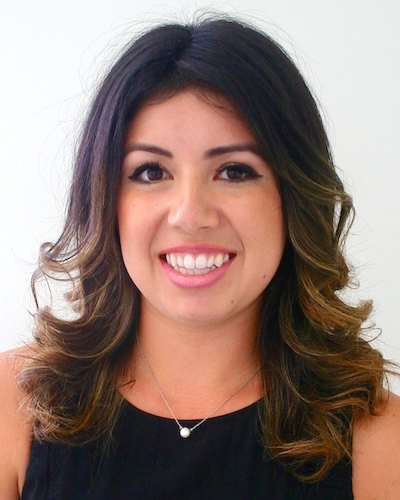
Happy World OT Day! ⟩
October 27, 2016, by Alyssa
Greetings! Hola! Bonjour! Ciao! 你好! Today we locally, nationally, and internationally celebrate our wonderful profession and all of the work that we do! Fight on!
⋯





